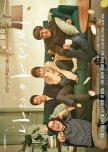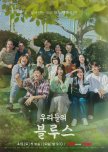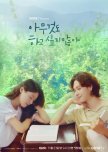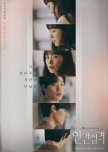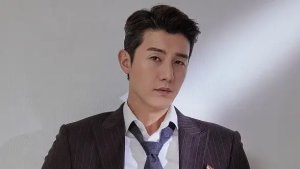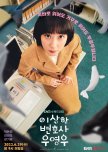 Kim Ji Won responds to reports of her starring in "The Price of Confession"
Kim Ji Won responds to reports of her starring in "The Price of Confession" Set in Sanpo Village where more people leave than remain, the three Yeom siblings, Chang Hee, Mi Jung, and Ki Jung, wish to escape from a life rife with uncertainty. A mysterious man, Mr. Goo, moves into their neighbourhood. He is a drunkard with the look of someone with many burdens and secrets. His cautious personality and preference for keeping to himself make him the subject of gossip. Mi Jung, the youngest and most timid Yeom sibling, decides to approach him. (Source: Namu Wiki, Pinkvilla) Edit Translation
- English
- 中文(台灣)
- Arabic
- Русский
- Native Title: 나의 해방일지
- Also Known As: My Liberation Diary , My Liberation Days , My Liberation Journal , Naui Haebangilji , Naeui Haebangilji
- Screenwriter: Park Hae Young
- Director: Kim Seok Yoon
- Genres: Romance, Life, Drama, Melodrama
Cast & Credits
- Lee Min Ki Main Role
- Kim Ji Won Main Role
- Son Suk Ku Main Role
- Lee El Main Role
- Lee Ki Woo Support Role
- Chun Ho Jin Support Role
Reviews

Progressive Message: Quality of life increases with the degree of truthfulness (not scham&pretence)
"My Liberation Notes" is a ray of hope within South Korean series production.In short: The lives of young people in their prime (+/- 30) are at stake here. Considering their groaning under the pressure of the competition in the workplace, the dazzling promises of the modern lifestyle industry, and the claims of society and family traditions, this could all be pretty depressing. But amazingly, it's not. The protagonists manage to give their lives something like dignity - quietly, impressively and with gentle intensity. They walk the way that lies before them, spraying their personal touch, a little bit, but nicely, thus leaving color and warmth on their trail.
The KDrama presents itself as a Netflix co-production and is thus in a certain way 'pimped' for an international audience - you don't see anything of the typical and rather special elements like makjang, slapstick, glitter & glamor of Jaebeol, or traumatic childhood secrets. Just life, every day, like everywhere else. Without spectacular ups and downs. As if someone had blindly reached into a pot full of addresses from a random location on the outskirts of metropolitan Seoul and then simply turned the spotlight and camera on the family living there for a while. In principle, it could be any family living near the terminal stations of the Seoul subway network. This, however, identifies the KDrama as specifically South Korean. Finally, the story is high KDrama quality, when it comes to a carefully, multi-layered narrative with deliberately reduced pace and space for the sensitive moments in between.
----------------- SIDE NOTE: --- Provincial life in the metropolitan area around the capital Seoul ---
So the KDrama simply tells about the normal life of relatively normal people around 30. They don't live in the megacity of Seoul (while almost 10 million people do) or in Incheon (with almost 3 million inhabitants), but in the sprawling province of Gyeonggi-do, which makes up the majority of the metropolitan area around Seoul in terms of space. The provincial population makes up ca half of the population of the more than 25 million inhabitants of the entire agglomeration around the capital Seoul. (And this in fact is about half of the inhabitants of South Korea altogether). An insight into the living environment of those provincial residents thus also offers an insight into a good deal of current South Korean life issues.
The fictional 'Dangmi Station' is actually Line 1's 'Seonghwan Station'. Crucially, most people who work in Seoul (increasingly) cannot afford to live in the city. Every workday they commute about +/- 2 hours to do their job in the city. With the evening company dinners and collegial come-togethers, a day becomes very long. There isn't much time left for a life of your own outside of work. While it is convenient in many respects to remain in the family home until marriage, this further reduces the amount of free time you have at your disposal. Especially if the parents still do a bit of farming and the help of the 'children' is required here and there.
City and country clash, almost every day. Accordingly, different life plans collide, which either fit more into a fast-paced, hip city life or rather into a rural, decelerated provincial life. In reality, however, new hybrid variants are needed that function as a flexible joint between both realities that are equally relevant to everyday life - city and country.
You might want to think about the meaning of life. About goals that you would like to set for yourself. What is life? What does it offer me? What would I actually like to do? Or, wait a minute, is it better not to think at all? It is up to the young people of the recent and the following working generation, to grope, to stumble, to develop new, visionary as well as down to earth attitudes and inspiring blueprints to life in a South Korea from the 2020s onwards...
------------------
"My Liberation Notes" sails in this field of tension. Other than that, tension is not on the agenda. "My Liberation Notes" is processing the wisdom, the questions and the insights that the protagonists come up with over the course of the story - sometimes quietly to themselves, sometimes in conversation with friends.
The focus is on 4 protagonists who practically all live together in the provincial suburb of Seoul. Three of them are siblings and work in Seoul, the fourth is a stranger who helps their father in the carpentry shop and in the fields, eats with the family and lives next door. (A fantastic Son Seok-ko as an inscrutable stranger, as well as Lee Min-ki, Kim Ji-won and Lee-El as very different siblings, are presenting the range of everyday emotional worlds in a wonderfully haunting way.) All four wrestle with life in their very own manner and question, what freedom and quality of life could mean to them under the given circumstances. Promotion? Money? Success? A car? A partner? Marriage? Family? Living in an apartment in Seoul? Where is life? Is this life?
Eventually the aspect of reverence also comes to the fore: To respect and be respected. To be worshipped. To be adored... Yet how to express mutual adoration and respect (in order for your own life to feel maybe a bit more valuable)? ... Maybe just give it more space. That would be great...
The episodes pass as does life itself. The days are the same, and yet each one is new and different from the one before. Happiness is accumulated by the minute. And in the end, life is beautiful after all. Worth living. Distinctive. The quality increases with the degree of truthfulness that they give to their lives. And that's indeed a progressive message (as far as a society like the South Korean with its highly valued tradition of scham and pretence is concerned.)
Was this review helpful to you?

Sing when you can not dance.
Uncertainties of life that should help us come out of our shells, often end up holding us back, and what life demands us to do is, put some efforts and liberate ourselves out of the incertitudes. After all, we do not notice that we are chained until and unless we move. What we are repeatedly reminded throughout our difficulties is that, real liberation is not achieved by burnishing and covering the painful memories, rather by experiencing it to the entirety. The drama is a reflection of numerous paths of liberating yourself, on your way to eternity and fulfilment.Jointly produced by 'Studio Phoenix', 'Chorokbaem Media' and SLL, "My Liberation Notes (나의 해방일지) [2022]" is a 8 billion won budgeted slice-of-life Kdrama. Reuniting writer Park Hae Young and director Kim Seok Yoon after 11 years, the show was broadcasted on JTBC and internationally distributed by Netflix.
The show takes place between the contrasting vistas of a quiet countryside, namely Sanpo of South Korea's South Gyeongsang Province and busy metropolis of Seoul. The show follows the life of three 'Yeom' siblings who are enervated of the sameness of adult life and their mysterious neighbour 'Gu' who is always by himself. As life happens to these people and the ones surrounding them, they set out on a prolonged and endless road, seeking liberation and eternity.
Yeom Gi Jung (Lee El), the oldest of the siblings, is huffy & short-tempered who always complains about everything, making silly judgements; yet wishes to find love and fulfill her life. Yeom Chang Hee (Kim Min Ki), the middle sibling, is awfully outspoken who despite of his crave for better life doesn't really have a goal and spends his leisure meaninglessly. Yeom Mi Jung (Kim Ji Won), the youngest, is faint-hearted and introverted who feels unfulfilled in her boring life, coveting to escape from all her worries. Mr. Gu (Son Suk Ku) is the closest next-door ahjussi who has recently moved to the neighbourhood and a drunkard who talks less and prefers to remain by himself.
Chun Ho Jin (Yeom Jae Ho) is the siblings' father while Lee Kyung Sung plays their mother Kwak Hye Suk. Ji Hyeon Ah (Jun Hye Jin), Oh Du Hwan (Hang Sang Jo) and Suk Jung Hoon (Jo Min Kook) are closest neighbourhood as well as childhood besties of the siblings. Cho Tae Hun (Lee Ki Woo) and Park Soo You (Park Sang Min) are Mi Jung's colleagues. Other familiar faces in the supporting roles are: Choi Hee Jin, Yang So Min, Kim Ro Sa, Jung Soo Young, Kang Joo Ha, Choi Min Chul and Kim Min Song.
Plot development is not a thing when you talk about slice-of-life genre and the show had the same case, for it doesn't indicate a particular direction or destination, that the characters must reach in order to imply an ending. Well, MLN is not feature obvious, with a gripping conflict or larger-than-life charactes. But them, their everyday desires, their disappointments, their emotions and their actions & reactions to what's (not) happening around them has been beautiful sketched and well developed. The show is quite for most of it's parts but still interesting, engaging and most importantly eternally healing, which makes it worth the time invested. The major characters go through a slow burn process, i.e. they don't change over the course of time, some, nor by the end of the show, but it affects us, the viewers, and that's the miracle of MLN as well as other slice-of-life shows.
There are times, when the conversations are very deep; people in duo or group talk about things that is deep-rooted in their souls, affecting their lives in ways that they didn't expect it to, and then the next moment, it turns into a talk about utter bullsh*t, about some stranger narcissistically screaming on the street or some chocolate teapot or a sack full of hammers (metaphorical). To put in simple words, sometimes it moves your heart but the next moment it's stupid and doesn't make sense. But all of these boils down to the very fact that you enjoy, relate and relive it and don't you think that's only "life" ? About the ending, it's pretty sorted and greatly satisfactory. Letting aside my personal feelings and rationalizing have the same results. I can't call it an open ending since it's a slice-of-life show and the ending of such always implies that our lives are continuous and life goes on even when the show comes to an end. You can pretty much draw your own conclusion, very easily.
Park Hae Young PDnim is one of the most respected names, who, with her relatively less created pieces, have been able to win hearts through her skills of storytelling in slice-of-life vignette. MLN has been a transporting story, with the ability of transcending into both beauty and disaster at the same time. Utilizing realism, jakkanim has attempted to examine small & ordinary yet powerful narratives of daily life. Mr. Gu's part of sure is a bit wilder for such genre, but you know, what? There is no such rule that a devil and it's tale can't be a part of a coming-of-age story (He ain't an evil man, if you're guessing so from the statement. It's generalized.). In an overall sense, jakkanim brings out the best possible characters, with their compelling environments or spaces they tend to, by drawing scenarios that allows us to relate the pieces with our very own experience.
Director Kim Suk Yoon PDnim with the fair share of experience of working in both thriller and softcore genres, including MLN, have been able to evince his skills through various dramas over the last 'half the decade'. The primary motto of the drama, i. e. the emphasis on the very moment, with the intent of focusing the audience on that moment rather than using that moment as part of a narrative, has been accurately executed, with lots of sense. The incorporation of touchy monologue notes and the flashbacks of foregone days, are of great interest with their ability to stir up both joy and misery, at the same time. The screenplay attempts to triumph over emotions by means of creating a still, tranquil and taciturn mood, and I must mention that this makes the show unique.
The framework of the drama is not set up in a colourful and fascinating setting yet something about the characters' environment will make you feel riveting & compelling throughout, hence proving once again, how it's a perfect example of living upto it's genre's essence. The pieces & elements of the drama offer insight into the small, common moments that might go unnoticed in bigger stories. Indeed, it has many conversations, actions and reactions that might feel unavailing, but it's a matter of time, you realize that you're living the moment, seeing yourself in the characters and have been a part of such discussions. The contrasting features of Seoul and Sanpo will often change thd vibes it radiate, while allowing you to capture the beauty of different realms.
The cinematography is beyond pleasing, I can't be lying. The art of storytelling through stills and visuals of this kind is definitely not new in Kdramas, however, MLN chalks up to recreating a narrative of idiosyncratic judgements. The makers attempt to enable the audience to live the essence and the way the presentation is drafted through vehemence is praiseworthy. Witnessing characters through refractive lenses (of the audience) by fetching and fluctuating camera angles, often from one's face, to a nearby glass frame were both palliating and allaying. The obliquely focusing camera, often alters into unorthodox minds of ingenious thoughts.
The two words the drama emphasizes on are: liberation (해방: haebang) and worship (추앙: chuang). Mi Jung's greatest force for personal liberation was her decision to widen her periphery of compassion as well as leniency, moving from focus on service to focus on self, which might seem contrary to what life demands, however, self-care has been of greatest value over years and we should be admiring the way she disenthrals herself throughout. Her portrayal constantly reminded me words from Paulo Coelho, "The beauty of truth: whether it is bad or good, it is liberating." Humble heart is the true contribution to worship, and to worship someone is powerful device that is able to dismantle every shackle and its able to breakdown every wall, of own and of the one you put at centre of your heart. Mr. Gu proved himself to be a good worshiper by enabling Mi Jung's life to be found settling within his soul. Robert Webber rightfully quotes, "Worship is an it-is-well-with-my-soul experience.”
Yeom Chang Hee and his life hacks; his agressive and loudmouth talks which can come off as rude and annoyance, is always contextualized, no matter where you see him. This guy, that guy, the talkative guy who always tries to shove knowledge into others, ends up making them realize that he actually makes sense. His facial expressions always imply that he's good intentions and that he really means what he's saying. Even with these, the way he strives do better in his job is commendable. His failures to achieve something might have let him down, but he immediately finding relief in little & meaningless things, have comforted me each time. Coping up with results in way that brightens your spirit, is what you must learn from him.
Yeom Gi Jung and her love interest; the one who might be picky and hasn't been able to find anyone to be able to love despite her age, ends up crying at the end of the day for being so miserable. With the guilt of committing wordily mistakes, she constantly tiptoes around people. To her surprise, when she falls in love with someone unexpected, she finds herself in a complicated situation where she has no path to chose, but remain at the same point. However, the way her life takes a turn, bringing immense happiness to her feet, it is alleviating to witness her tears of joy. Sticking to your persona and being patient can result in fruitfulness is what you can take home from her.
Yeom Mi Jung and her misplaced emotions; not like she hasn't tried, but then, not like everyone succeeds even after multiple and constant attempts. Time doesn't heal all wounds. In a family where emotions are not transparent, in a workplace that doesn't appreciate and in a friend circle that doesn't understand, she must have feel suffocated and wronged. So, it's actually coherent & lucid, why she wishes to break free from everything and run away as far as the road takes her. The constant urge to become liberated from all her worries has made him into a cold-hearted woman. Consistency, straightforwardness, know-how and maturity are what you should be able to receive from her.
Mr. Gu and his mysteries; aahhh! What a personality and what a development. The way he walks, carelessly and as if it's tiresome to even move, the way he stretches his entire body & neck in order to avoid what's happening around him, and staring up the sky aimlessly, and his facial expressions, that includes reactions to what he's told; I am mesmerized how all of these transcend into a feeling of admiration and respect to this character. He was indeed full of mystery; talking less, remaining by himself and drinking all the day, it was crystal clear that he bears something heavy in his heart. Yet, stupefyingly, he inspires others, makes others think mighty of him and uses no effort in allowing everyone fall for his aura. Take as much as he offers. And on that note, Mr. Gu is the new crush of millions" including myself; I had seen him before, but the difference persona and his character are what aroused my heart.
"My Liberation Notes" in many ways establishes and emphasizes various forms of friendship. The very fact that we vibe differently with different people at the same time, even within the same group, has been beautifully demonstrated. ''The things we share with our friend A, we can't spill that to friend B' " sorta feelings. From neighborhood buddies to workplace collegues and from school classmates to long lost acquaintances, MLN throws light upon both the importance and complications of each.
One of the many silliest means of liberating yourself, that has been portrayed through the acts of the characters, throughout the drama is "moving your feet"; be it a tiresome walk or a simple strolling or a breathless running. As you walk/run and think at the same time, the worries and burdens might evaporate away little by little, if not entirely, and that actually helps. As you watch the drama, you will realize that there are actually plenty of scenes where the characters are only moving forward with monologue notes accompanying them, and those were actually gratifying and alleviating, or in the words of the writer, "liberating".
Chang Hee's admiration for Mr. Gu, the way he looked upto him, him calling 'hyung' and was able to extract out inspiration from Gu's life, was quite an intrigue. Even with no definite bromance, MLN showcased a meaningful non-romantic bonding between two men, who despite of their personal conflicts, were able to unbar the ways to relief & salvation. I can go on about how I felt looking at Chang Hee's eyes & emotions for Gu-shi multiple times.
Composed by Kim Tae Sung PDnim, there are 12 OSTs in total, including one which has both male & female versions. Most of the songs are soothing and assuaging, which depicts the slowburn theme and realistic essence of the show. I can't say the entire album is my favourite but sure, I like all of them.
# "A Kind of Confession" is my most favourite track which has both female and male versions, sung by HEN & Kwak Jineon respectively. It reflects a realistic love that is unpredictable and full of uncertainties.
# "I Think I Know" by Isaac Hong accompanied Gi Jung's love story as an appreciation to souls that heal each other.
# "Here We Are" by Kim Feel is a song about the wary of life delineating melancholy and I believe it was dedicated to Mr. Gu.
# "Deeply" by HEN, as it's title says, is about deep assessments of the events of our life.
# "To be together" by Lee Jung Hyung reflects the warmness from the embrace of love. The prelude theme of the track is used as the intro of the show.
# "Laggard" by Shin You Me is a track meant for Mi Jung and her introverted spirit that urge to come out of the shell.
# "That Day" by The Orchad is a mildly jolly song about the brightful days of expressing and experiencing love. It was for Gi Jung.
# "Be My Birthday" by Ha Hyunsang was a soulful rendition about all the first time that you get to live after falling for someone.
# "We Sink" by SWAY is an upbeat composition about the thick & thins of life, that bring forward variable opportunities, which in ways, emphasizes on Chang Hee.
# "My Spring" by Lee Soo Hyun is a softcore track about the feelings of times spent with your soulmate.
# "Diamond" by 9duck is another jolly track which radiates admiration for the one you love.
One of the many moving elements in the drama was Mi Jung's desire to be able to reminisce about past where she herself is be-seated by her younger self's side, enjoying the views she really loved and Mr. Gu suggests her to remember the very moment and remind it when she turns old, because by then, the present time would be her younger version. Similarly, I would like to mention few of short yet relatable and favourite dialogues which aren't actually spoilers...
# "I feel scared of being honest."
# "Suddenly, I feel lovable."
# "You should know who you are."
# "Now we can say, we have watched stars together."
Before I sign off, I would have loved to talk about "my liberation diary" and the "haebang (liberation) club", the most motivating idea of the drama that puts Mi Jung at the centre, but I truly want all of you, reading this, to witness and experience it by your own.
Final Remarks... Ahhhh! That's how you express yourself with drama that could imply to a plentitude range of emotions and thoughts, throughout. Coming to the last part of my review, I am not sure whether or not I was worthy of writing this piece, for it is so beautifully contented which not only took the characters in the journey of liberation, but also helped the viewrs learn how to liberate themselves. With great production values, fascinating script, fabulous execution and beautiful outcomes, this is one of the best slice-of-life Kdramas ever produced even so it didn't have a noteworthy viewership record as it aired. I wish it could reach a lot more people but I also believe, good things always find their ways to those who deserve. With this, I must not forget to express my gratitude to the cast and crew and everyone plus everything that's involved in bringing out "My Liberation Notes" to me. Thank you, so very much!
Was this review helpful to you?
Recent Discussions
| Title | Replies | Views | Latest Post | |
|---|---|---|---|---|
| The ending of drama; interpretations and theories. by aein | 14 | 0 | Axsenex Oct 30, 2023 | |
| my liberation notes (My issues with it) spoilers by xONLYINHUMANx | 2 | 0 | Disgursting Sheet Aug 17, 2023 | |
| favorite quotes by veronika79 | 8 | 0 | nuka Jun 16, 2022 | |
| Ending of each episode? by Conservative Torch | 1 | 0 | Cherrymotion May 26, 2022 | |
| Who is Mr. Goo? by Cherrymotion | 9 | 0 | Bernie831 May 23, 2022 | |









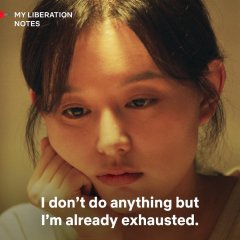


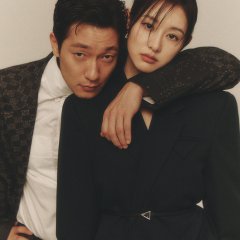
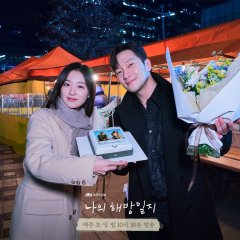
 1
1 2
2